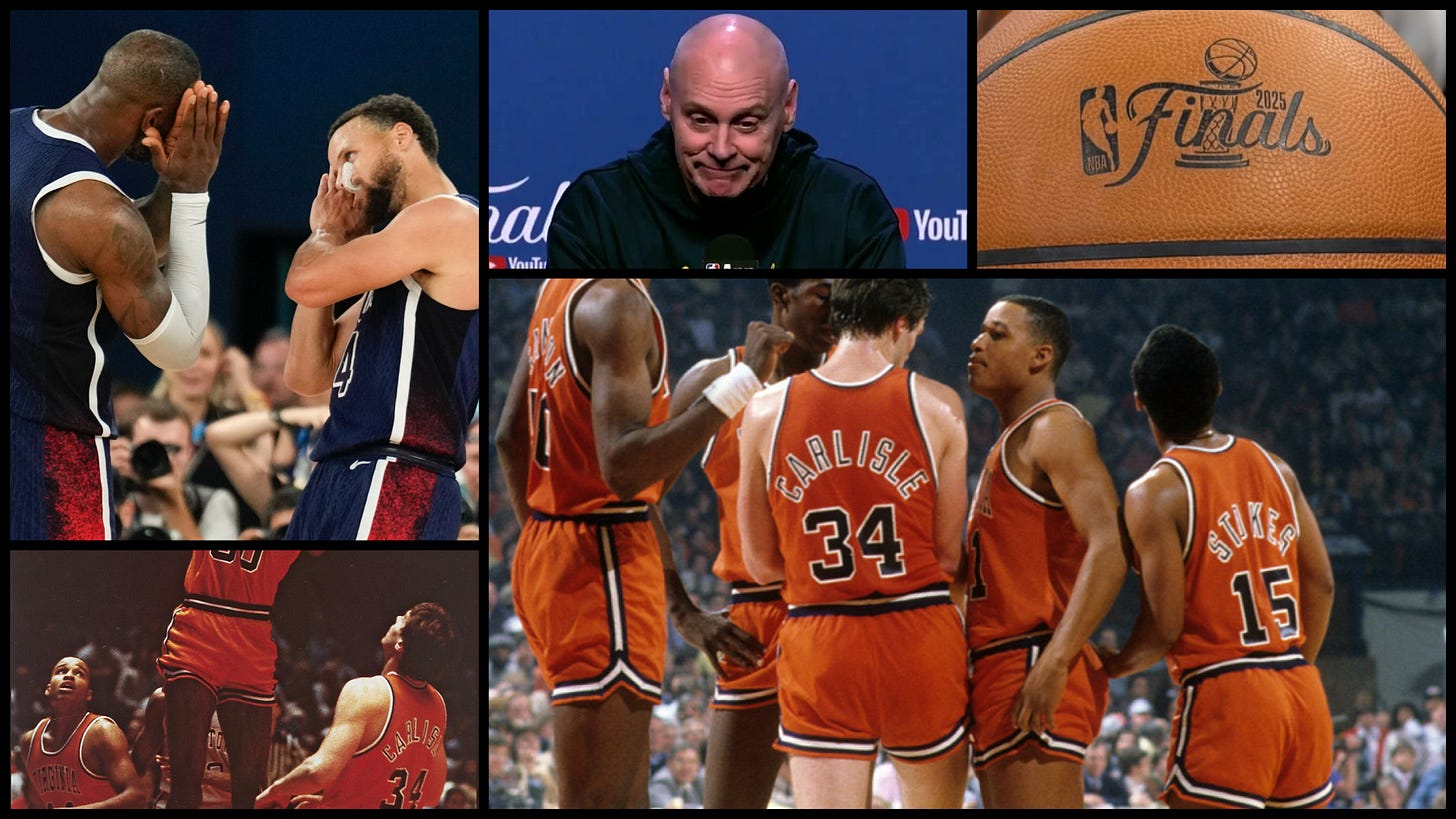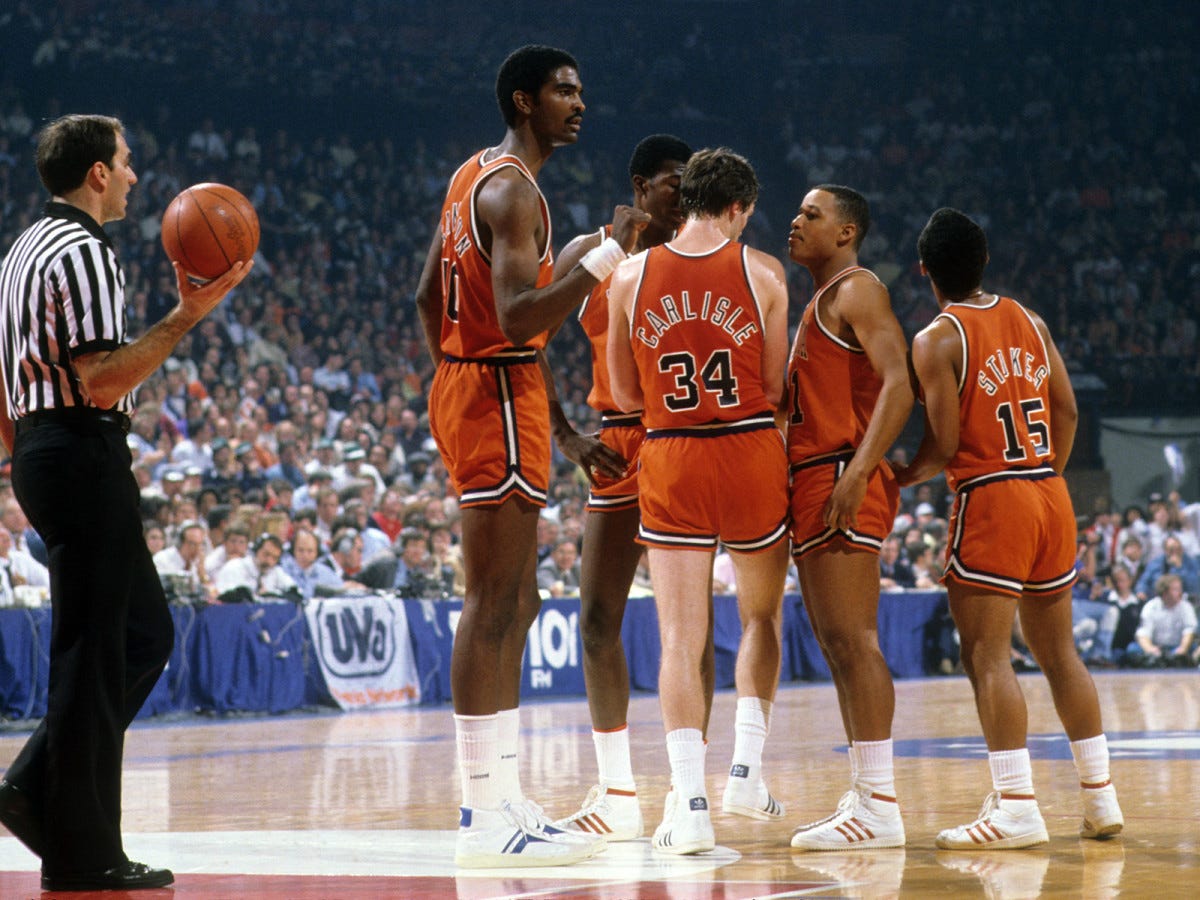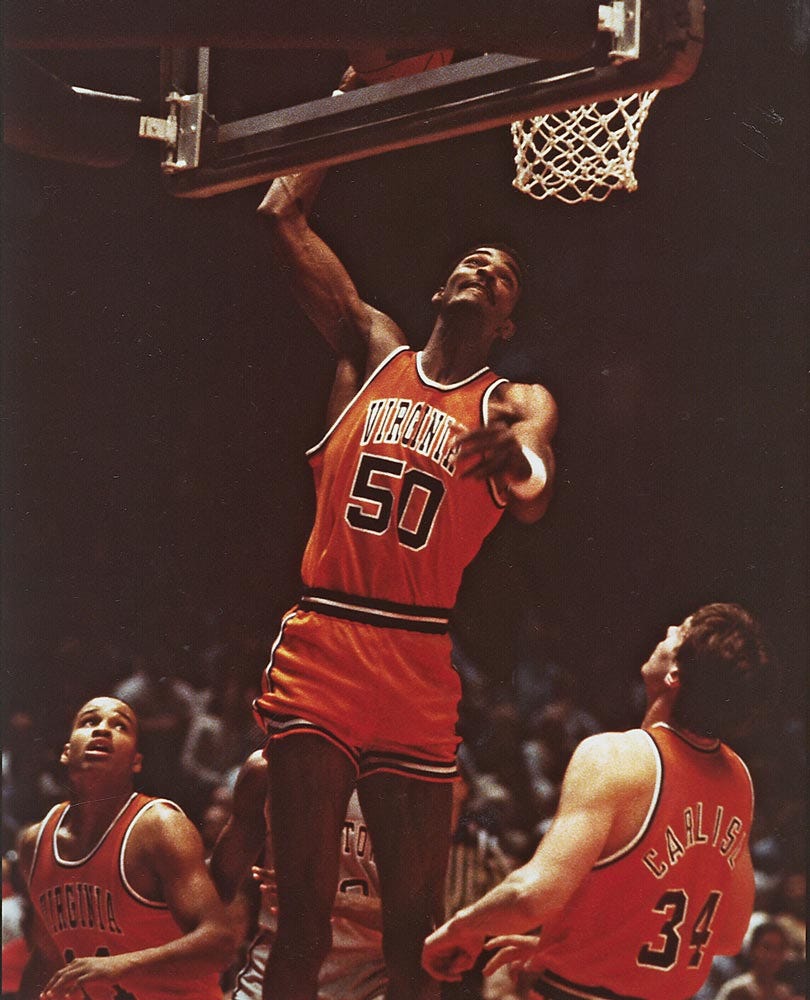Rick Carlisle references Curry and a Warriors Hall-of-Famer
[NBA Finals video/transcript]
Pretty cool walk down nostalgia lane at Rick Carlisle’s NBA Finals practice podium on Wednesday, the day before Game 1 of the 2025 NBA Finals. Not only did he confirm one Wardell Stephen Curry as, along with LeBron James, “still the gold standard” of the NBA in terms of the faces of the league, but those of us who were privy to the entire interview got a little history lesson(s).
[NOTE: This is a free article and the previous paywalled one on Jonathan Kuminga and Mike Dunleavy, Jr. is hereby unlocked.]
Turns out, when asked by fellow “north country” — like, really up there in Upstate New York — native Tim Reynolds of the Associated Press, about the firing of Tom Thibodeau as head coach of their mutually regional Knicks, then following up with a reference to Ogsdenburg, where Rick was born, we learned that Carlisle played one year of college ball at Virginia with Ralph Sampson! 🤯
University of Maine was my only Division I offer, went there for two years and then through a series of connections and relationships, was able to transfer to University of Virginia and played with Ralph Sampson for a year. And that changed my life forever and had great coaching and a lot of things that were very fortunate. And ended up getting drafted by Boston in a round that no longer exists in the Draft. And a lot of things fell my way, but I worked hard too.
And so here are the complete pictures to the above with both Sampson and Carlisle in them (courtesy: SportsIllustrated and Getty Images, respectively):
In case you didn’t know, Sampson was traded to the Warriors in 1987 when George Karl was the head coach and Don Nelson was the general manager. Per Wikipedia, “on February 4, 1987, (Sampson) suffered a major cartilage tear in his left knee” as a member of the Houston Rockets, but Karl and Nelson still thought Ralph “would be a key center threat for a team that was looking to build upon their 42-win season the previous year but had just a 3–15 record to start the year…
“The Warriors won just 20 games that year (1987-88). The following year, he played in 61 games with 36 as a starter, but he averaged just 6.4 points per game with five rebounds. The Warriors made the postseason that year and reached the Semifinals, but Sampson only made an appearance in the second round, playing 43 total minutes against the Phoenix Suns.”
That 1988-89 squad featured rookie sensation Mitch Richmond, Winston Garland at point guard — current Eastern Conference All-Star Darius Garland is his son — Chris Mullin, Rod Higgins and Larry Smith as the small-ball 5.
Terry Teagle came off the bench as a scorer for the second unit and Manute Bol was the backup center. Otis Smith, who later became GM of the Orlando Magic, was sometimes in the rotation as a guard-forward and Steve Alford was the backup point guard.
Golden State somehow swept an earlier version of the John Stockton and Karl Malone Utah Jazz in the five-game opening playoff series, but succumbed to Phoenix, led at the time by Cal great Kevin Johnson, Tom Chambers and Dan Majerle.
A rookie, drafted with the 50th overall pick by the Suns, averaged just six minutes per game and played in only 26 games with DNPs across the board in those same playoffs.
This rook? Steve Kerr, of course!
A month-and-a-half after being eliminated by PHX in five games, Nellie would draft Tim Hardaway, thus beginning what would later be termed the “Run TMC” era.
Btw, the 7’4” Ralph Sampson was inducted into the Basketball Hall of Fame in 2012.
One more Warriors reference, as mentioned by Carlisle on the podium (see full transcript below): Indiana native Kevin Pritchard was selected by Nellie as the 34th overall pick in that 1990 NBA Draft where Hardaway was selected 14th overall.
The transcript below also includes a pretty neat Sam Presti origin story…
FULL TRANSCRIPT:
00:00 We will take the first question on the left side here, fourth row.
00:04 Conrado Giulietti from ESPN Brazil. You have been in 2011 Finals as an underdog and you guys won. How do you think that experience can help you through these Finals and how to pass that to your players?
00:25 RICK CARLISLE, DAY BEFORE GAME 1 NBA FINALS: Yeah, Oklahoma City's a great team. And yeah, we're aware of what's expected here. And we've got a lot of work cut out for us. A lot of our guys have been through a lot of situations where they've been underdogs in the past and it's simply gonna come down to us being able to play our game at the best possible level. We're gonna need to take care of the ball because these guys turn people over at a historic rate and we're gonna have to make some shots.
01:07 Joe (Vardon), up here in the front.
01:09 Hey Rick, there's been some discussion this week about this being a small market Finals and the Thunder were just up there, said some really cool stuff about what it's like to play here. You've had this long career and lived and worked in massive markets and small markets. What do you find is the charm of coaching and working in Indianapolis?
01:38 A lot of people talk about great places to live. When you have a good situation, you're working with great people and your team is good, that's a great place to live and small market, big market, it's doesn't matter. I just have such great respect for what Oklahoma is building here. I know Mark Daigneault pretty well and Sam Presti and I go way back. I was invited to San Antonio's training camp in the Fall of 2000 when I was headed into a year where I was gonna take a year away and ended up doing broadcasting stuff, but Sam Presti was an intern for the Spurs at that time. And yeah, I remember he's from the Boston area, so he had grown up a Celtics fan, so he actually remembered when I played, which was miraculous to me. It seemed like he was probably way too young for that, but we had a couple of dinners together and he asked me, "What can I do? I gotta somehow get a job out of this." I said, just become a guy that they can't live without and Sam is a great demonstration of resourcefulness and wherewithal and stuff like that. And he's forged himself a great career. He and Kevin Pritchard are two of the best franchise builders around. And so this series really should celebrate those two guys and their staffs and what they've done, but as far as the markets, I understand that there would be concern for how many people would watch because they're smaller markets, but if we're celebrating the game and we're putting game above all, which was one of the things that Adam Silver said when he became commissioner, that really shouldn't matter. It really shouldn't matter and I know that we're gonna do our very best to represent our city, our state, at the best possible level. Thunder will do the same, but this really, hopefully, is about the quality of the games and we got our work cut out for us there.
04:27 On your right. Second row, Tim.
04:29 Tim Reynolds, AP. Rick, if I may ask you to put your NBCA hat on, what was your reaction yesterday when you heard about Tom (Thibodeau)?
04:37 Yeah, I get asked frequently about these things and I always say, "Shocked," and then sometimes you get numb and you're not shocked, but the Knicks have such a unique situation, with so much attention and such a large fan base and such a worldwide following, it's one of the most difficult jobs to take. The guys that have been most successful, Red Holzman, Pat Riley, Jeff Van Gundy, Rick Pitino had a short run, but a very effective run. And then there were a lot of lean years and Thibs went in there and changed so much and so you look at all that and then what happened yesterday, and when I first saw it, it came over one of the — I thought it was one of those fake AI things, that no way this — there's no way possible. And I know how the players feel about him. Too. And there's not much else to say. Teams and ownership can make these decisions unilaterally and it's their right to do that. And Tom will certainly be fine. I don't think he's gonna have any problem finding his next job. It's gonna depend on when he's ready to jump back in again, but I have great respect for Thibs. I go back with him a very long way, and so I was surprised.
06:38 One follow. As you gave the anecdote yesterday of driving from Lisbon to Ogdensburg — as probably the only other guy in the room who's been to both Lisbon and Ogdensburg, I feel like I can ask this.
06:49 Wow.
06:51 Yeah. Where you're from, guys don't go to the NBA. It just doesn't produce NBA players. When Jimmy Howard had a great career as a goalie in the National Hockey League, that's —
07:02 He's from Ogdensburg.
07:03 Yes, but not the NBA.
07:06 No, it's —
07:07 Were you ever dissuaded when you were like, "This is the path I want to go down, I wanna play at Maine, I wanna play at Virginia. I wanna play big-time basketball." Did you ever think, "No, I can't because nobody here has done it." When did you — how did you get past all that?
07:23 One of my best friends growing up was a guy named Hal Cohen who played at Syracuse University and he was the greatest player to ever come out of the north country. He was two years ahead of me in high school and he got a scholarship to Syracuse University, so he got a scholarship to a big-time basketball program and I grew up playing with him all the time, competing, and it was one of the reasons that I ended up having a chance to get a Division I scholarship. I had to go to prep school to do it. I went to Worcester Academy for a year. University of Maine was my only Division I offer, went there for two years and then through a series of connections and relationships, was able to transfer to University of Virginia and played with Ralph Sampson for a year. And that changed my life forever and had great coaching and a lot of things that were very fortunate. And ended up getting drafted by Boston in a round that no longer exists in the Draft. And a lot of things fell my way, but I worked hard too. And seeing Hal Cohen do that was something that gave a lot of people, a lot of guys in the north country, a lot more belief about being able to go to higher levels, not just in basketball but other sports. And I think Jimmy Howard would be another example of that.
08:59 Time for a last question. Tania, in the back.
09:02 Tania Ganguli, New York Times. There's so much discussion about who's the next face of the league. I've even seen it phrased as an existential question for the league, after Steph and LeBron retire, what happens? I was wondering what you think about — to what degree that is imperative for the league, for the health of the league — do there have to be a couple of guys that sort of, the whole ecosystem revolves around?
09:35 Having been drafted in 1984 in the midst of the Bird-Magic explosion of the NBA, I think people would assume that. It was Larry and Magic and then it was Michael Jordan for a few years. And then — but things are changing. The roster construction seems to be evolving in a slightly different direction, if not a pretty significantly different direction. And it's possible that there are always gonna be stars, but identifying with teams may become more of a significant thing than just the star aspect of it. We'll have to see. It's such a dynamic business and it's so quickly changing and it can change on a moment, in a moment, much like a playoff series can, but I just think the league is so healthy right now because there are so many young, great, young players that have personality, that are such great promoters of the game, simply by virtue of how they play the game with their joy, with their love. It's moving away from an isolation league to really more of a team type game. Oklahoma plays that way. We try to play that way. And so time will tell, but LeBron James and Steph Curry, those guys are still the gold standard, really. They're still it. And those guys have been absolutely beyond belief.
11:35 Thank you, Coach.
🫶💙💛




